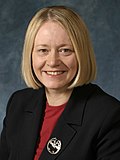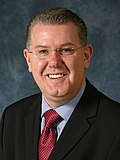1 August – 13 September 2008 | |||||||||||||||||
| |||||||||||||||||
| |||||||||||||||||
The 2008 Scottish Labour Party leadership election was an internal party election to choose a new leader of the Labour Party in the Scottish Parliament, and was triggered following the resignation of Wendy Alexander following a row over donations to her own leadership campaign in 2007. [1] Iain Gray won the contest and was announced as leader on 13 September 2008.
Contents
- Successfully nominated candidates
- Nominations
- Result
- Round 1
- Round 2
- Suggested candidates not standing
- Timeline of events
- See also
- References
It was the second Scottish Labour leadership election in as many years, the first being caused by the resignation of Jack McConnell, [2] following the Scottish National Party's victory over Labour in the 2007 Scottish Parliament election, however in this election, Alexander was unopposed, meaning that no ballot actually took place. [3]
The timetable for the election was finalised on Monday 28 July, having been put on hold for a month to allow the party to focus on the Glasgow East by-election, [4] which ultimately saw the Scottish National Party overturn a 13,507 Labour majority to gain the seat. [5] Nominations closed at noon on Friday 1 August with the result being declared on Saturday 13 September.
A deputy leadership election was held alongside the leadership election following the resignation of Cathy Jamieson on 28 July. Johann Lamont was elected deputy leader.


